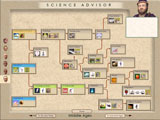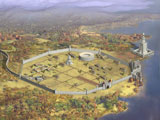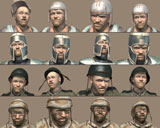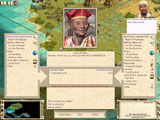 Do you remember Falco? Don’t
feel bad if you can’t, because you’re certainly not alone. But I’ll bet you
remember "Rock Me Amadeus." Something about that song rocked hard enough to
catch the attention of the eighties. Surely you remember the eighties—a whole decade
of flash-in-the-pan artistry that didn’t breed a single Led Zeppelin or Rolling
Stones, even though the music industry was as vibrant as ever. There were plenty of rock
stars getting filthy rich off the proceeds of a single song, and some of them are still
coasting on that song to this day. There’s the music business for you.
Do you remember Falco? Don’t
feel bad if you can’t, because you’re certainly not alone. But I’ll bet you
remember "Rock Me Amadeus." Something about that song rocked hard enough to
catch the attention of the eighties. Surely you remember the eighties—a whole decade
of flash-in-the-pan artistry that didn’t breed a single Led Zeppelin or Rolling
Stones, even though the music industry was as vibrant as ever. There were plenty of rock
stars getting filthy rich off the proceeds of a single song, and some of them are still
coasting on that song to this day. There’s the music business for you. Every morning
Sid Meier wakes up and thanks God that the computer game industry is not the music
industry. If the two were alike, for instance, Meier would be living in a trailer park off
the proceeds of 1991's scorching success Civilization, or he’d be touring state fairs
playing it at the beginning and end of every set. But Meier proves there’s no such
thing as a one-hit wonder in the computer business by releasing the third revision of his
game, Civilization III. It’s, you know, like the first and second one, only
different. How different? Good question.
Every morning
Sid Meier wakes up and thanks God that the computer game industry is not the music
industry. If the two were alike, for instance, Meier would be living in a trailer park off
the proceeds of 1991's scorching success Civilization, or he’d be touring state fairs
playing it at the beginning and end of every set. But Meier proves there’s no such
thing as a one-hit wonder in the computer business by releasing the third revision of his
game, Civilization III. It’s, you know, like the first and second one, only
different. How different? Good question.
 If for some reason you’ve been living in a cave for the last decade,
you’ll need to be told that Civilization is the wildly popular turn-based strategy
game that offers players the chance to lead their people from the bronze age to the
information age. Along the way you overcome obstacles like the unhappiness of your own
citizens and the hostility of other civilizations, guiding your scientists through
researching advancements from the alphabet to stealth technology. Will you go down as a
militaristic bully or a peaceful and glorious bastion of high culture? Will you rocket to
Alpha Centauri or pound your enemies into dust? Commanding an empire that spans millennia,
you make these decisions and more.
If for some reason you’ve been living in a cave for the last decade,
you’ll need to be told that Civilization is the wildly popular turn-based strategy
game that offers players the chance to lead their people from the bronze age to the
information age. Along the way you overcome obstacles like the unhappiness of your own
citizens and the hostility of other civilizations, guiding your scientists through
researching advancements from the alphabet to stealth technology. Will you go down as a
militaristic bully or a peaceful and glorious bastion of high culture? Will you rocket to
Alpha Centauri or pound your enemies into dust? Commanding an empire that spans millennia,
you make these decisions and more.
 So you can see why Civilization was so popular in the first place. What’s
not to love about immortality, power, and the quest for world domination? Indeed,
Civilization set a standard that no game has ever succeeded in matching. Master of Orion
and other turn-based strategy games have sometimes worked from the same principle, but
they have you taking over the galaxy instead of the planet, or they concern themselves
with a particular period of time. For strategy games that span from the dawn to dusk of
time, pitting you against various civilizations while forcing you to rule wisely over your
own, Civilization remains in a category of its own.
So you can see why Civilization was so popular in the first place. What’s
not to love about immortality, power, and the quest for world domination? Indeed,
Civilization set a standard that no game has ever succeeded in matching. Master of Orion
and other turn-based strategy games have sometimes worked from the same principle, but
they have you taking over the galaxy instead of the planet, or they concern themselves
with a particular period of time. For strategy games that span from the dawn to dusk of
time, pitting you against various civilizations while forcing you to rule wisely over your
own, Civilization remains in a category of its own.
 In
fact, if the game ever had a weakness, from the beginning it’s been the ambitious
scope of everything Civilization tries to accomplish. Like its predecessors but now a
little more so, this latest installment forces players to confront the nagging question of
how much is too much. Civ III threatens to outgrow its britches with a fully indexed
instruction manual that weighs in at more than 230 pages, a user interface that has to
gracefully allow the micro-management of potentially every city on the face of the earth,
and a clunky troop system that theoretically allows for global military campaigns, but
really amounts to watching your enemies charge around and shoot at you, and then guiding
your troops to charge around and shoot at them. Some changes in this addition do attempt
to help with the administration of less significant matters. For instance, there are now
governors in every city who can be told to take over production duties and concentrate on
manufacturing food or trade or industry. There’s an updated culture algorithm that
calculates how far your civilization’s cultural influence extends, which also
determines your borders for the purposes of military invasion. If your cultural
advancements are particularly impressive, foreign cities will secede and flock to your
banner.
In
fact, if the game ever had a weakness, from the beginning it’s been the ambitious
scope of everything Civilization tries to accomplish. Like its predecessors but now a
little more so, this latest installment forces players to confront the nagging question of
how much is too much. Civ III threatens to outgrow its britches with a fully indexed
instruction manual that weighs in at more than 230 pages, a user interface that has to
gracefully allow the micro-management of potentially every city on the face of the earth,
and a clunky troop system that theoretically allows for global military campaigns, but
really amounts to watching your enemies charge around and shoot at you, and then guiding
your troops to charge around and shoot at them. Some changes in this addition do attempt
to help with the administration of less significant matters. For instance, there are now
governors in every city who can be told to take over production duties and concentrate on
manufacturing food or trade or industry. There’s an updated culture algorithm that
calculates how far your civilization’s cultural influence extends, which also
determines your borders for the purposes of military invasion. If your cultural
advancements are particularly impressive, foreign cities will secede and flock to your
banner.
 Culture
represents just one of the now six different ways the game can be won. Where before you
either had to colonize Alpha Centauri or destroy all your rivals, now you can compel other
civilizations to join your magnificent culture, establish a vast majority of the
world’s population under your control, be elected Secretary-General of the United
Nations, or secure the highest Histographic score when the game’s time limit runs
out. All of these options require maintaining a happy civilization and secure boundaries,
but apart from that there’s room for several different playing styles. For once,
wonders of the world like Shakespeare’s Theater have the kind of global impact they
deserve, and it’s possible for turtle-like players, who keep all armies within their
own borders and focus on city improvements, to rule the day.
Culture
represents just one of the now six different ways the game can be won. Where before you
either had to colonize Alpha Centauri or destroy all your rivals, now you can compel other
civilizations to join your magnificent culture, establish a vast majority of the
world’s population under your control, be elected Secretary-General of the United
Nations, or secure the highest Histographic score when the game’s time limit runs
out. All of these options require maintaining a happy civilization and secure boundaries,
but apart from that there’s room for several different playing styles. For once,
wonders of the world like Shakespeare’s Theater have the kind of global impact they
deserve, and it’s possible for turtle-like players, who keep all armies within their
own borders and focus on city improvements, to rule the day.
 Unfortunately,
turtle players like myself have been severely neutered in Civ III. Recall that the way to
be a true turtle player is to focus on building incredible cities and gaining knowledge
advancements at an accelerated rate. This used to be much easier in Civ II, where you
could learn the Republic form of government, convert, and then advance so quickly that
sometimes you had tanks in the 1500s, and you could fight horsemen with mechanized
infantry. Those were some great times. I guess that kind of mercurial advancement pissed
off one too many history nerds, because in Civ III it’s impossible to gain knowledge
quickly enough to be even a century ahead. And even if you do pour 70% of your GNP into
science, even at the easiest levels your foes will have somehow kept up with you while
also building huge armies. In Civ II, you could get away with fewer military units of
higher quality and giggle the whole time you destroyed their primitive asses. Those
halcion days are gone forever in Civ III.
Unfortunately,
turtle players like myself have been severely neutered in Civ III. Recall that the way to
be a true turtle player is to focus on building incredible cities and gaining knowledge
advancements at an accelerated rate. This used to be much easier in Civ II, where you
could learn the Republic form of government, convert, and then advance so quickly that
sometimes you had tanks in the 1500s, and you could fight horsemen with mechanized
infantry. Those were some great times. I guess that kind of mercurial advancement pissed
off one too many history nerds, because in Civ III it’s impossible to gain knowledge
quickly enough to be even a century ahead. And even if you do pour 70% of your GNP into
science, even at the easiest levels your foes will have somehow kept up with you while
also building huge armies. In Civ II, you could get away with fewer military units of
higher quality and giggle the whole time you destroyed their primitive asses. Those
halcion days are gone forever in Civ III.
 To make
matters worse—and stupider—you now have to find salt peter before you can have
musketeers, or you have to find oil reserves and steel before you can have tanks and cars.
This would be understandable, and might even make the game more fun, were it not for the
fact that these resources never, and just to make things perfectly clear, despite what the
player’s manual says about these resources appearing when you gain the knowledge that
makes them useful, let me repeat, these resources NEVER appear within the boundaries of
your established civilization. Oil will not be under them thar hills outside your capital,
it will be in the middle of a vast desert on another continent, and you’ll have to
build a crappy little city that will be young and defenseless and will inevitably be
overrun by other civilizations jealous of your high culture.
To make
matters worse—and stupider—you now have to find salt peter before you can have
musketeers, or you have to find oil reserves and steel before you can have tanks and cars.
This would be understandable, and might even make the game more fun, were it not for the
fact that these resources never, and just to make things perfectly clear, despite what the
player’s manual says about these resources appearing when you gain the knowledge that
makes them useful, let me repeat, these resources NEVER appear within the boundaries of
your established civilization. Oil will not be under them thar hills outside your capital,
it will be in the middle of a vast desert on another continent, and you’ll have to
build a crappy little city that will be young and defenseless and will inevitably be
overrun by other civilizations jealous of your high culture.
 Devotees of the Civilization industry will probably find enough new gizmos,
like animated troop icons that sink into the ocean or fall down when they die, to make
buying this version worthwhile. Newcomers will probably find enough here to entertain
them, especially since they won’t know what they’re missing from previous
versions. After all, Civ III remains unparalleled in its breadth and scope. But if you
liked Civ II just fine, or if you don’t need a turn-based conquer- and- rule- the-
world fix right now, then it’s likely you’ll be better off waiting for Master of
Orion III. Or even Civ IV.
Devotees of the Civilization industry will probably find enough new gizmos,
like animated troop icons that sink into the ocean or fall down when they die, to make
buying this version worthwhile. Newcomers will probably find enough here to entertain
them, especially since they won’t know what they’re missing from previous
versions. After all, Civ III remains unparalleled in its breadth and scope. But if you
liked Civ II just fine, or if you don’t need a turn-based conquer- and- rule- the-
world fix right now, then it’s likely you’ll be better off waiting for Master of
Orion III. Or even Civ IV.
